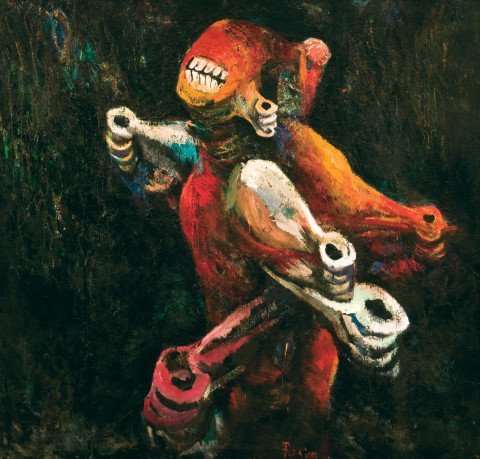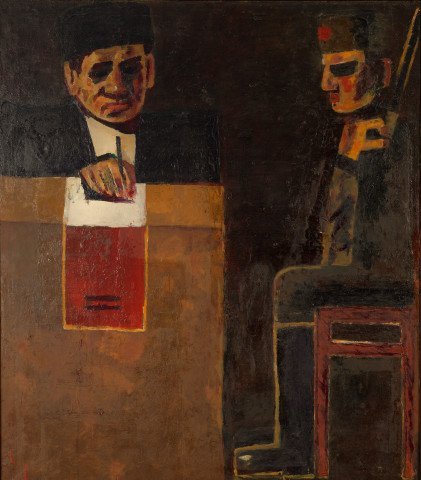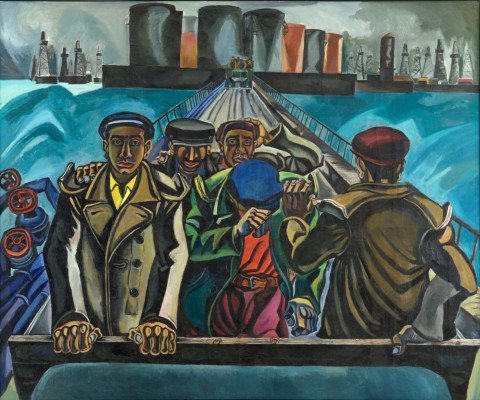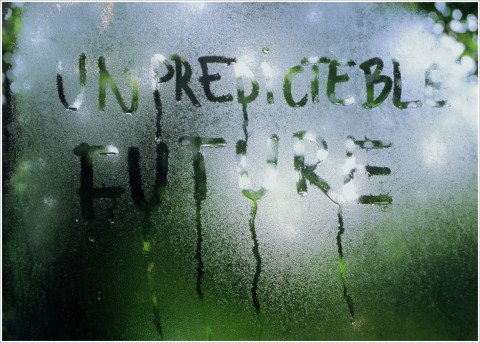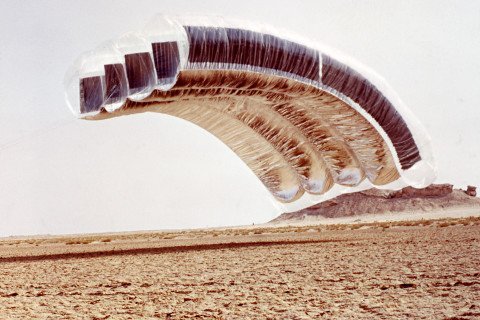56° Venice Biennial: the impossible dialogue between Karl Marx and the Azerbaijan’s pavilion
- Beyond the lIne: Rasim Babayev, Dictator, 1976, oil on cardboard, 85×96 cm Artist’s collection Photo: Mirnaib Hasanov. Image courtesy of Heydar Aliyev Foundation.
- Beyond the lIne: Ashraf Murad Voting, 1971, oil on canvas, 133×153 cm. Collection of Museum of Modern Art, Baku, Azerbaijan. Photo: Mirnaib Hasanov. Image courtesy of Heydar Aliyev Foundation.
- Beyond the lIne: Oil Workers, 1958-1959, oil on canvas, 250×300 cm Collection of Museum of Modern Art, Baku, Azerbaijan Photo: Mirnaib Hasanov. Image courtesy of Heydar Aliyev Foundation.
- Vita Vitale: Mircea Cantor, No Title (Unpredicteble Future), 2004 Light box 60 x 80 x 8 cm Courtesy of Rennie Collection.
- Vita Vitale: Graham Stevens, Desert Cloud, 1974. Video installation still from filming in Arabian Desert; 16mm colour film in DVD An Airworks production for the Arts Council of Great Britain (1976). Courtesy of the artist.
The Republic of Azerbaijan is among the nations officially taking part in what will certainly be remembered as the most politically oriented Venice Biennial of the new millennium; a Biennial that is going to be marked by the epic live reading of all the three volumes of Karl Marx’s “Das Kapital” which will be performed throughout the seven-month long exhibition by professional actors in an “active space” – designed by the archistar David Adjaye – located within the Central Pavilion in the Giardini.
To make it clear, the official introductory text to “All the world’s futures” – this is the title chosen by the 56 Venice Biennial Central Pavilion’s curator Okwui Enwezor – states:
“Beyond the distemper and disorder in the current “state of things,” there is one pervasive preoccupation that has been at the heart of our time and modernity. That preoccupation is the nature of Capital, both its fiction and reality. Capital is the great drama of our age. Today nothing looms larger in every sphere of experience, from the predations of the political economy to the rapacity of the financial industry. The exploitation of nature through its commodification as natural resources, the growing structure of inequality and the weakening of broader social contract have recently compelled a demand for change.”
With this is mind, it is probably useful to remember that some observers consider the Republic of Azerbaijan’s leader Ilham Aliyev an autocrat. According to the 2014 US State Department’s human rights report, he is responsible of “increased restrictions on freedoms of expression, assembly and association, including intimidation, arrest and use of force against journalists and human rights and democracy activists online and offline”.
Ilham Aliyev is also supporting the Swiss consortium behind the Trans Adriatic Pipeline (TAP), a 2,000-mile gas pipeline linking Azerbaijan with Europe whose final leg is going to be constructed in Puglia, near Lecce, despite the protests of the residents who don’t want “one of the most pristine areas of the Mediterranean” to be corrupted by what they consider an highly invasive infrastructure. It may be that the protests are excessive, because many other similar pipelines have already been constructed with low environmental impact. Nevertheless it must be said that also the United Kingdom’s former prime Minister Tony Blair has been criticized by the international press for the support he is giving in regards with this issue to the Azerbaijan’s leader.
Unconcerned about Mr. Enwezor’s call to the holy book of Communism, the former Soviet Union country will take part to the Venice Biennial with two shows, both supported by the Heydar Aliyev Foundation, the main cultural institution of Azerbaijan, founded in 2004 “to support studying, promotion and implementation of the policy guidelines developed by eminent political figure Heydar Aliyev aimed at the country’s social, economic and cultural development, increase of living standards and further integration with the civilized world”. Heydar Aliyev, Azerbaijan’s president from 1993 to 2003, was Ilham Aliyev’s father. Mehriban Aliyeva, his wife, is the president of the Heydar Aliyev Foundation and a Goodwill Ambassador for ISESCO and UNESCO.
The first show that will represent the Republic of Azerbaijan at the 56 Venice Biennial is co-curated by the famous Swiss art auctioneer and collector Simon de Pury. Located at Palazzo Lezze (Campo Santo Stefano) and titled “Beyond the Line”, it gathers together works executed during the Soviet regime by dissident artists such as Ashraf Murad, Javad Mirjavadov, Tofik Javadov, Rasim Babayev, Fazil Najafov, Huseyn Hagverdi, and Shamil Najafzada. Perhaps it has also to be said that the the Trans Adriatic Pipeline will substantially reduce Gazpron’s supply to Europe.
The second show, at Ca’ Garzoni (San Marco), is titeld Vita Vitale and through the works of about thirty international artists including big names such as Ugo Rondinone, Diana Thater, Tony Cragg and Julien Opie. By questioning the human impact on the natural environment, it represents Azerbaijan’s sensitivity in regards with this issue.
Now the question is, can Karl Marx’s masterpiece respond to the complicated forces driving the international culture diplomacy? Or, better, are the ideas expressed in that book really useful to explain all the contradictions of the internet information era? By participating for the second time at the Venice Biennial – and with the pavilion at the Expo in Milan – Azerbaijan is courageously expressing the desire to make the international and most experienced audience aware of its nation-building process. On the contrary, celebrating 200-years-old theories on the altar of contemporary art may just prove the impossibility of imagining any of the world’s possible futures.
March 26, 2015

